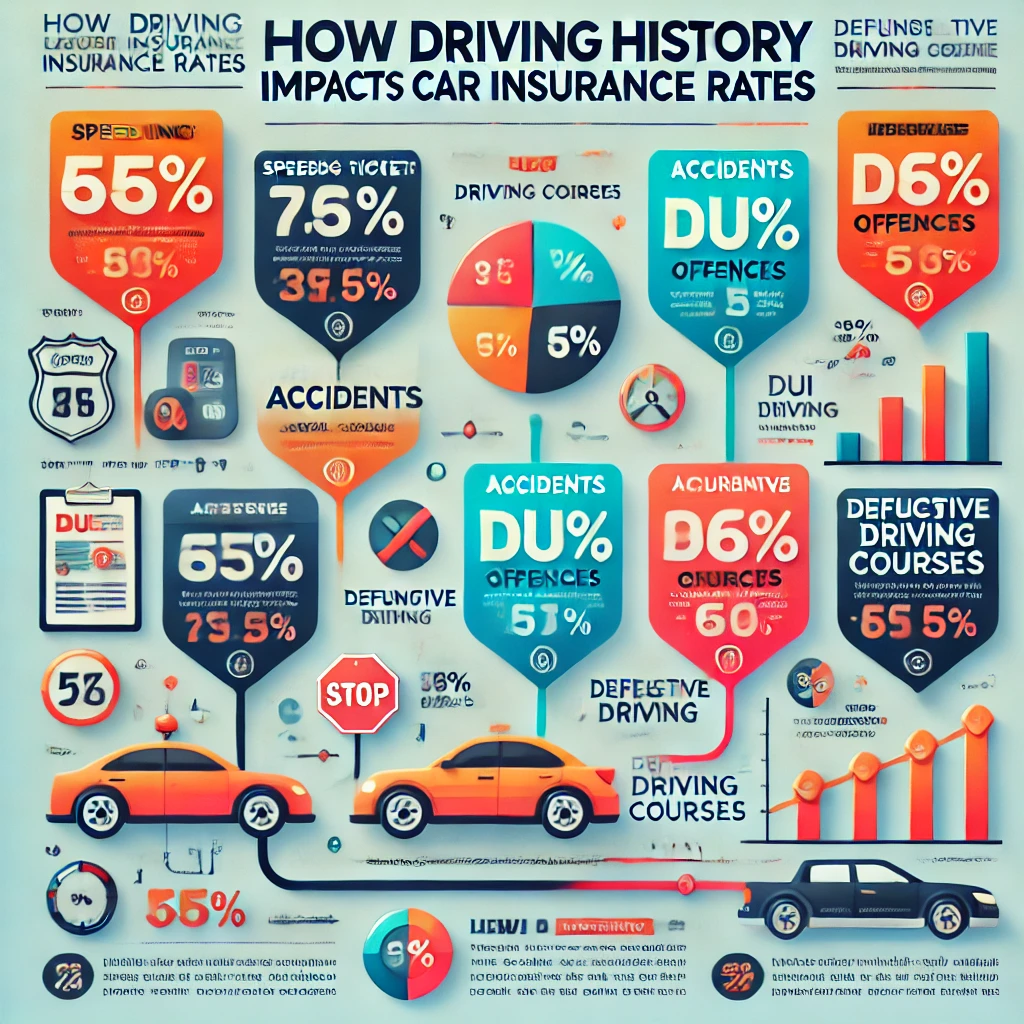Auto insurance premiums can vary significantly based on numerous factors. Whether you’re a new driver or an experienced one, understanding these factors can help you reduce costs while ensuring optimal coverage. In 2025, insurers continue to use advanced algorithms, AI-driven risk assessments, and big data analytics to determine policy prices. Below are the key elements influencing your auto insurance rates.
1. Driving History
Your driving record is one of the most significant factors affecting your insurance premium. Insurers assess your history for accidents, traffic violations, and claims.
- Clean Driving Record: Lower premiums due to minimal risk.
- Speeding Tickets & Violations: Can increase rates by 20-30%.
- At-Fault Accidents: Can raise premiums by 40% or more.
- DUI/DWI Offenses: May double or triple your insurance costs.
2. Age and Experience
Young and inexperienced drivers tend to have higher premiums due to their statistically higher accident rates.
| Age Group | Average Annual Premium (2025) |
|---|---|
| 16-19 | $3,500 – $6,000 |
| 20-25 | $2,500 – $4,500 |
| 26-35 | $1,800 – $3,000 |
| 36-50 | $1,200 – $2,500 |
| 50+ | $1,000 – $2,000 |
3. Location and Zip Code
Where you live significantly impacts your insurance rates. Urban areas generally have higher premiums due to increased traffic congestion, crime rates, and accident risks.
- High-Crime Areas: More vehicle thefts and vandalism lead to higher costs.
- Rural Areas: Lower traffic congestion often results in reduced premiums.
Top 5 Most Expensive States for Auto Insurance in 2025
- Michigan – $2,750/year
- Louisiana – $2,600/year
- Florida – $2,550/year
- California – $2,400/year
- New York – $2,350/year
4. Vehicle Type and Model
Your car’s make, model, and year impact insurance costs.
- Luxury & Sports Cars: Higher repair/replacement costs lead to higher premiums.
- Electric Vehicles (EVs): Higher initial insurance rates due to expensive battery replacement but potential discounts for eco-friendly choices.
- SUVs & Trucks: Vary based on safety ratings and accident rates.
5. Coverage and Deductibles
The type of coverage you choose affects how much you pay.
- Liability-Only Coverage: Cheapest option; meets state minimum requirements.
- Full Coverage (Collision & Comprehensive): Higher premium but provides extensive protection.
- Higher Deductibles: Lower premium costs but higher out-of-pocket expenses in claims.
6. Annual Mileage
Insurers evaluate how often you drive.
- Low Mileage (Under 7,500 miles/year): Discounts available.
- High Mileage (15,000+ miles/year): Higher risk of accidents, leading to increased premiums.
7. Credit Score (In Some States)
Many insurers use credit scores to assess financial responsibility.
- Excellent Credit (750+): Lower insurance costs.
- Fair Credit (600-750): Standard rates.
- Poor Credit (<600): Premiums may be 50-100% higher.
8. Marital Status
Married individuals often receive lower insurance rates due to being statistically safer drivers.
9. Gender (Limited Impact in Some States)
Although the difference is minor, younger male drivers often face higher premiums than females.
10. Discounts and Bundling Options
Many insurers offer discounts to reduce costs.
- Multi-Car Discount: Insuring multiple vehicles with the same provider.
- Safe Driver Discount: Accident-free period incentives.
- Defensive Driving Courses: Can lower premiums by 5-10%.
- Bundling Home & Auto Insurance: Potential savings of 10-20%.
- Military or Student Discounts: Special programs for eligible drivers.
11. Claims History
A history of frequent claims can lead to higher premiums, even if the claims were minor.
12. Insurance Provider Differences
Each insurer uses unique rating factors. Comparing quotes from multiple providers is essential.
Top 5 Auto Insurance Companies in 2025
| Rank | Company Name | Average Annual Premium |
|---|---|---|
| 1 | State Farm | $1,400 |
| 2 | GEICO | $1,450 |
| 3 | Progressive | $1,500 |
| 4 | Allstate | $1,550 |
| 5 | USAA (Military) | $1,300 |
Final Thoughts
Understanding the factors that affect your auto insurance premium allows you to make informed decisions.
Ways to Lower Your Auto Insurance Premium
- Maintain a clean driving record.
- Improve your credit score (if applicable).
- Increase your deductibles for lower monthly costs.
- Take advantage of discount programs.
- Compare rates from multiple insurance providers.
- Choose a vehicle with lower insurance costs.
By following these tips, you can optimize your coverage while keeping your premiums as low as possible in 2025.





